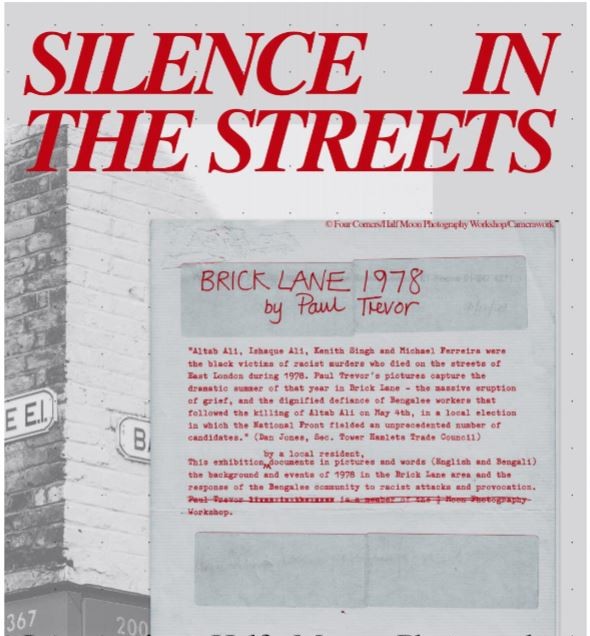Central Saint Martins MA students interrogate the archives

This month we enjoyed working with a talented group of MA students from Central Saint Martins. Their original assignment to produce an exhibition from the archives of Half Moon Photography Workshop was cut short by the Covid-19 pandemic. Despite this setback, they swiftly devised an alternative project that could be delivered under lockdown.
The result is Silence in the Streets. The website features a publication and public photography project, drawing upon the community-focused work of the Half Moon Photography Workshop while responding to the current situation.
MA student Greta Voeller writes about the group's aims behind the project.
We live in strange times. In only a few months we have experienced an invisible revolt, a drastic change in perspective and habitual living conditions. Everything just stopped. What once happened outside, now takes place indoors. Our walls are deemed protectors, instead of dividers, and we meet through the distance that unites us. Our streets are empty and still, and yet entirely filled by our voices that have been silenced.
As we interrogate this present state, we must acknowledge the privileged position we occupy as creative practitioners, analyzing the currents of our cultural pasts and shaping the rhythms of our probable futures. The contemporary condition is in a state of crisis due to its missed efforts to practically assert an alternate post-capitalist domain, a novel environmental consciousness, dominant layers of globalism and technology, and unresolved uncertainties of exceptional nature. Yet as strange and unsettling as this temporal space may seem, it inundates us with opportunities to forethink and restructure the paradigms that held us captive. We live in strange times whose strangeness can be shaped into a new norm, a novel embodied consciousness of communal thinking and surviving.
We are together in this, are we not?
With this premise, we have interrogated these central concerns which shape the backdrop of our publication and its adjacent website, acting as artefacts in combining historical and contemporary sentiments on the dubious yet expanding state of human existence during moments of crisis.
The intention of this project is not to attempt answers or possible solutions to existential questioning, but rather to invite further queries when confronted with a state of unknowingness.
This project is a curatorial investigation, which was incepted during a stage of pre-crisis, but once the Coronavirus hit our global population, it forced us to rethink our condition and the purpose of our work. When being thrown into such a sudden state of critical amendments, issues around the importance of art and documentation during times of isolation became pertinent.
The starting point of our research lies in the archival nature of our curatorial brief; investigating the work and mission of British community photography group Camerawork through the archive material available at London College of Communication (LCC). As we encountered the content produced by the photography collective, whose standpoint was clearly one of protest towards institutionalized structures of knowledge and artistic merit, we started questioning our own position as audiences, creatives and prosumers. Formed initially as a group of community photographers enabling a cultural détournement on documentative photography, the collective later expanded into a gallery called Half Moon Photography Workshop and its extension Camerawork magazine. Our curatorial team has identified a central question that defines the collective’s aims and carries its legacy: Who is it for?
As we were asked to re-adapt the curatorial brief of constructing a physical window display at UAL to a virtual space, due to the devastating effects of COVID-19, we decided to expand this question into enlarged spaces of communal encounters. The notion of community as a central focus of our work, remained a principle factor in deciphering both the historical and contemporary notion of documenting ‘communities in crisis’.
The result behind this thinking is an online platform which incorporates two distinguishing aspects, responding to the same preoccupations. The publication covers the archival work we have been privileged to develop, looking at Camerawork’s legacy and focusing on a particular event; the Brick Lane riots documented by Paul Trevor. This historical incident is used here as a case study to discuss Camerawork’s stance and methodology of capturing socio-cultural turning points. As an extension of this publication, the online component expands into a selection of responses from an array of contributors, who answered to the prompt of documenting the idea of community during the current COVID-19 isolation. The name we have chosen for this project, ‘Silence in the Streets’, serves as a metaphorical reference to how we perceive our surroundings in times of change, but also how silence can be an indicator of a halt during a crisis scenario. We interpret it as a direct link to the way protest has traditionally been tackled, i.e. on the streets, which serves as a metaphor for the place where we come together as communities, where we unite, where we provoke change but also where we escape from.
The platform acts as a curatorial space that evokes questioning on historical and contemporary notions of community, and whilst the documentation on this topic keeps changing and shifting according to the times it is produced within, its purpose does retain common threats that cannot be ignored.
In our iconomy-infused society, the notion of spectacles we encounter daily have mutated into nurturers and distracters of knowledge and human emotions. But whilst we feed on information, it is the essence and intention of the slices we consume that will fully sate us. This is what we attempted to do here, providing longevity to Camerawork’s archive and extending it through a contemporary lens. We hope to provide a platform whose demystification in procedure allows for ‘shared experiences’ and so ‘contribute to the process by which we grow in capacity and power to control our own lives’.
There’s a noise that still echoes in the streets; it’s our voices that may seem silent but they’re alive.
Posted by Carla Mitchell on 4th May 2020 at 12:00am